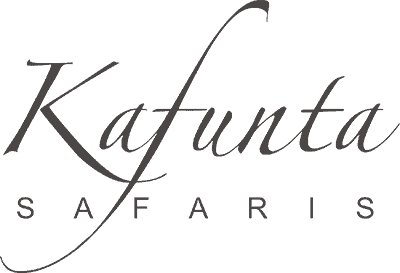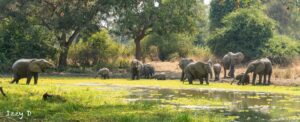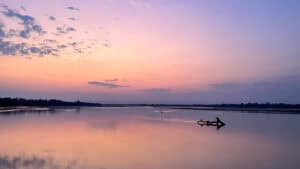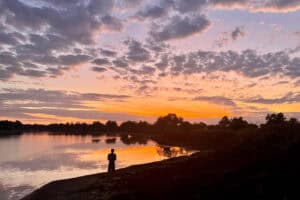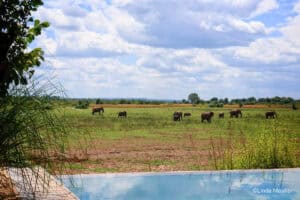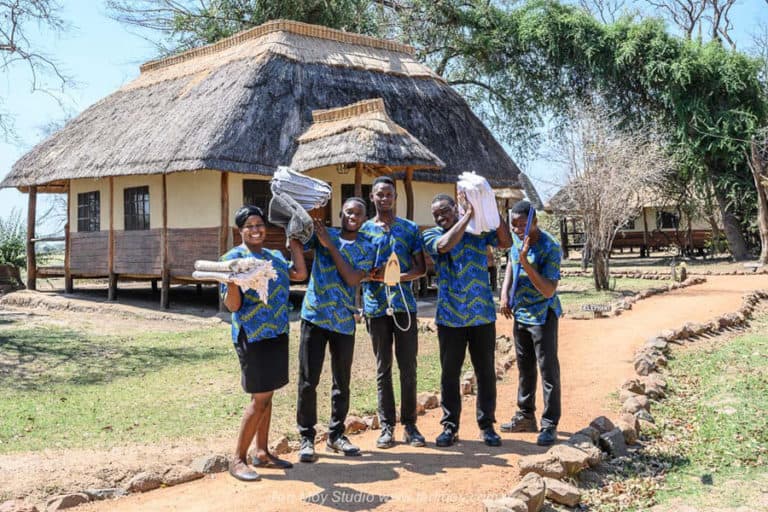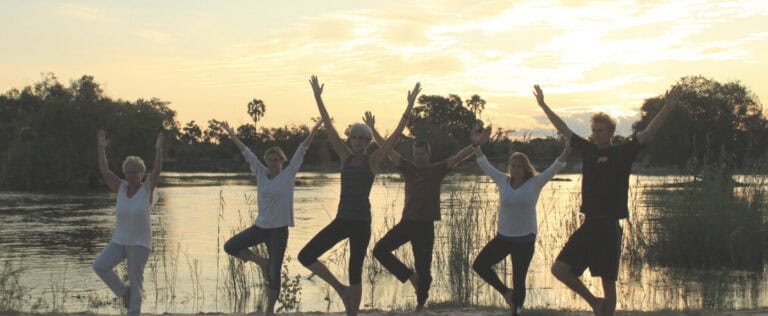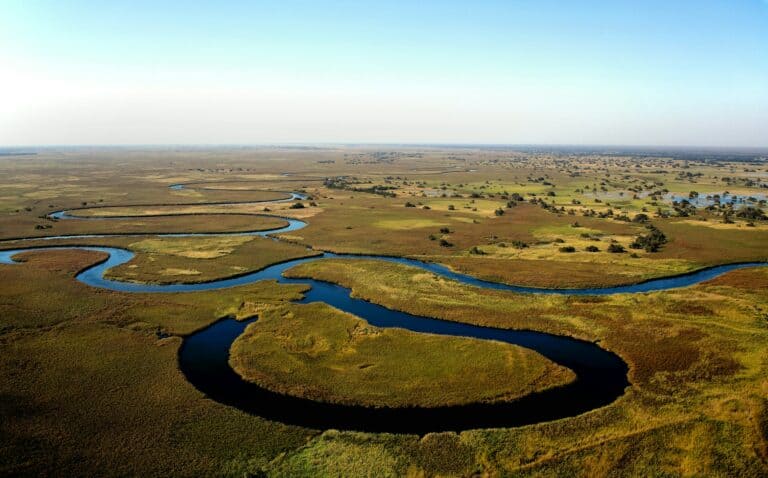Have you ever wanted to hear the best tips from an insider, from a professional safari guide so you can obtain the best answers to your questions?
We asked our very own safari guides for their most valuable tips, so that you can trust the experts.
9 Safari Guides, 9 Essential Tips for a successful safari.
- David on Activities
- Martin on Field Guides
- John on Binoculars
- Ernest on Guiding Ethics
- Davey on Dresscode
- Solomon on Expectations
- Andrew on Dialogue
- Paul on Photography
- Joseph on Birding
To David: What is your favorite safari activity?
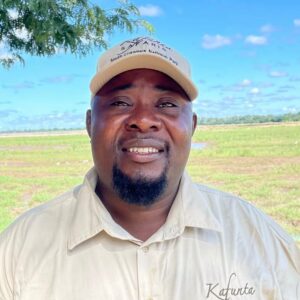
I think what is important on safari is to try everything that’s on offer, at least once.
Here in South Luangwa, we focus on game drives or walking safaris. We can also do all-day drives. If you go to Lower Zambezi, where they have stable river systems, water-based activities are also available (boat cruises, canoeing, fishing). So different parks have different options.
My favorite activity is by far the walking safari. It’s a slow walk, focusing on the little things such as animal prints, poo, plants, and birds. We can sometimes come across big game such as elephants which is very exciting, but we need to be very careful and stay well out of their paths. We are escorted by an armed scout who can focus on scanning the environment while I talk to guests about all the interesting things nature offers. It really is a different experience, at ground level, which gets all your senses going.
But if you want to observe lions, leopards, and big predators, then the activity of choice is of course a game drive in one of our open vehicles. Animals are not as nervous of vehicles as they are about people on foot, so it’s much easier to approach them this way.
To Martin: Which safari field guidebook do you recommend?
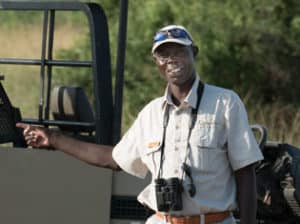
I have been guiding for over 25 years and I’ve used many different field guides in my career. For us safari guides, these are essential tools as important as a good pair of binoculars. And we’re very protective of them. They are particularly important for birding as we can point bird characteristics to guests as we find different birds and discuss the differences between species. Something I love doing when I have keen birders among my safari guests.
By far my favorite book is “The Wildlife of Southern Africa: A field guide to the animals and plants of the region” by Vincent Carruthers because it is light to carry around, even on walks! It covers a very wide range of wildlife for quick checking in the field and then it’s always possible once back in camp to gather more information and cross-check facts with other books like the Roberts, Estes and Palgrave.
If I was to establish my recommended list it would be as follow:
- Field guide to the animals and plants of the region by Vincent Carruthers
- Pathfinder: Illustrated for Nature Enthusiasts by Janesta Pulella
- The Behavior guide to Africa Mammals, including hoofed mammals, carnivores, primates by Richard Despard Estes
- Trees of Southern Africa by Keith Coates Palgrave
Are you planning a safari? Download our in depth Zambian Safari planning guide!
To John: Are binoculars important for A safari?
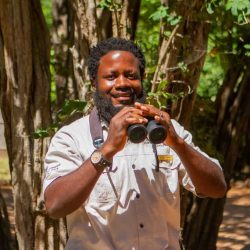
Yes absolutely!
Not many guests think binoculars are important on safaris, but I couldn’t do my job without them. And it’s very common for us safari guides to hand our binos to the guests so they can spot birds or even leopards hidden in the bush or look at interesting details on a sighting. It really brings wildlife viewing to a higher level.
I understand it’s a heavy and sometimes costly item to bring, but one per family will usually suffice. And they will be used for years to come, even in your own garden back home.
Binoculars are defined by their magnification (how many times they make things appear bigger, so the higher the better) and the diameter of their objective lens (the big side of the binocular – the larger the better). But the quality of the material and lenses themselves will determine the price and overall quality of the product. You want something that remains light enough and easy to handle/use, to keep the image steady.
My recommendation is to choose binoculars with a magnification of 8 to 10, for a lens size of 40 or 42. These offer the best balance and are most suitable for wildlife viewing.
Common brands are Nikon, Celestron, and Vortex. Zeiss and Swarovski are the top-end brands.
Ideally, you want to try the binoculars before buying them, to check the comfort for your eyes. Go to a specialist shop (outdoors outfitters, photographic equipment shops) and try them out by looking outside.
To Ernest: What are guiding ethics?
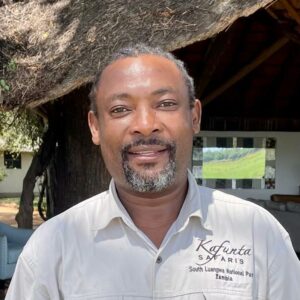
To become a safari guide we must spend many years studying and practising in order to obtain our guiding license. Our license is the most important thing for us, without it, we’re unable to work and keep a job.
When guiding we must respect the rules and regulations set up by the park authorities. Those are what we call ethics, but also common sense to respect the animals, the land and the biodiversity in general. It’s important for our guests to understand this because if we don’t respect rules and have good guiding ethics, we risk losing our license.
One of the common requests we get is to drive off-road, or closer to animals. It’s not always permitted, as most of the time we have to stay on designated tracks. When driving off-road we destroy microorganisms and plants and we can also disturb animals. Imagine driving on well-camouflaged eggs or squashing a beetle!
It is really helpful when our guests understand these constraints and respect them (and support us in respecting those rules), so we don’t jeopardise our livelihood – and we also respect wildlife and the environment.
To Davey: What colors should you wear on safari? Is the dress code really important?
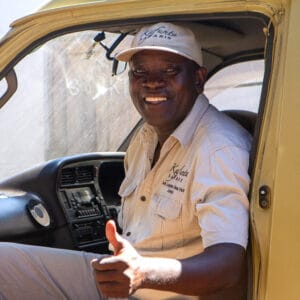
Yes and no. Wearing subdued color clothing helps blend in the natural environment which makes it always easier to approach animals.
On walking safari, it is essential as animals are by nature very wary of humans on foot, and it’s also safer for the group to blend in.
On game drives, it’s not as important but personally, I find it nicer to have natural tones than bright colorful clothing which is out of place in the wilderness. That’s why you’ll never see safari guides wearing red or bright orange for example!
Therefore, I recommend choosing the following colors: beige, browns, soft greens and soft yellows. Avoid bright red, pink, blue or orange. White is not so good on walks. Dark blue and black attract heat and tse tse flies, so it’s best to also avoid them too.
And when you’re not on activities you can wear whatever fun colors you want.
TO SOLOMON: What should I expect to see on safari?
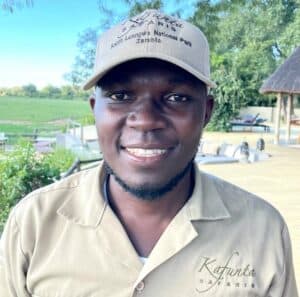
Be open-minded! Going on a safari is not the same as taking a walk in a zoo or animal park. We never know what to expect and we can’t predict how successful an outing will be. Of course, as safari guides, we try hard every morning and evening to find as many animals as possible, but to do this we rely on what nature gives us – we listen to birds and alarm calls from primates or antelopes. We look at tracks, at broken branches. And we let our intuition kick in.
When guests are putting a lot of pressure to only find lions or leopards it usually doesn’t work as we miss out on the little things that would otherwise help us progress in our search for animals. It’s very important to remain open-minded and appreciate everything that we come across. And it brings good karma! Sometimes we miss an animal by a couple of seconds, but sometimes those few seconds bring us to an unexpected and wonderful sighting!
Another recommendation I would give is to spend more time in the same area, so for example stay more nights at one lodge rather than hop around every second day! If you’re a bit unlucky, moving around all the time may not bring you the experience you were hoping for.
To Andrew: What if I have a special request?
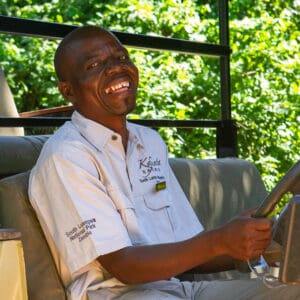
One of the tips I give all my guests when I first welcome them is to talk to me. Let me know what you’re interested in, what you’ve already seen or not, and what is missing on your list of birds or mammals. Are you uncomfortable with elephants? Let me know. If you tend to be shy, don’t worry, you can talk to us in private as well.
The dialogue is very important for us so that we can work together to make your safari the most successful experience. Not everyone is interested in the same thing or has the same expertise. And if you’re not happy with something, speak up too. It’s important to solve a little misunderstandings early in the process.
To Paul: Do you have any tips for photography while on safari?
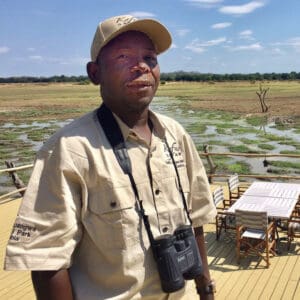
Most of my guests will have some sort of device to capture photos or videos. It can be from a simple smartphone to an elaborate multi-thousand dollars safari camera and lenses. It’s important everyone enjoys their passion, whatever the level, and brings home quality images.
As Andrew mentioned, it’s important to talk to your guide about what your interest is or objectives are. Sometimes guests have different wishes that are not compatible. For example, a video photographer will not like other people talking, or camera shutter noises interfering with his/her recording. Knowing all this will help us plan logistics and group like-minded guests together. I often suggest booking a private vehicle for those who wish to be in full control of their activities. Another recommendation is to sometimes leave your camera on the side and absorb the moment. Nature has so much to offer, it’s good to be one with it outside of a camera viewer.
And when you’re back at the lodge or back home, please share your images with us! We love to feature them in our social media and newsletters.
To JOSEPH: What do you recommend for keen birders?
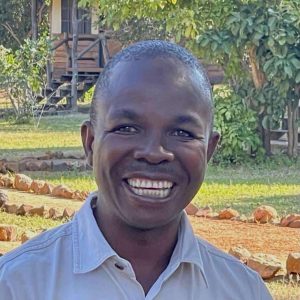
Birding in Zambia is exceptional! South Luangwa has over 400 recorded species of birds. So if you are a keen birder, you’ll have plenty to keep busy with. Make sure to inform us of your interest so that we can pair you with like-minded guests, or you may actually choose to book a private vehicle to be in full control of your safari.
Birding is good year-round, but the breeding season for most species coincides with the rains (when foliage is full and there are plenty of insects too). For amazing breeding plumage, I’d recommend coming in November and December, then when we first reopen in April.
Early in our operating season (April to June, July) we find good colonies of storks, especially crowned cranes. As the oxbow lagoons dry up (August, September, and October) we come across massive fishing parties of herons, egrets, and various storks. In late August, the beautiful Carmine-Bee Eaters start gathering in large colonies and build their nests. We can observe these until the end of the year. The weavers will be more active from November onward.
The Pel’s Fishing Owl, often on birders’ lists, can be seen year-round (with a bit of luck).
Curious about our guides? Learn more about them here.
